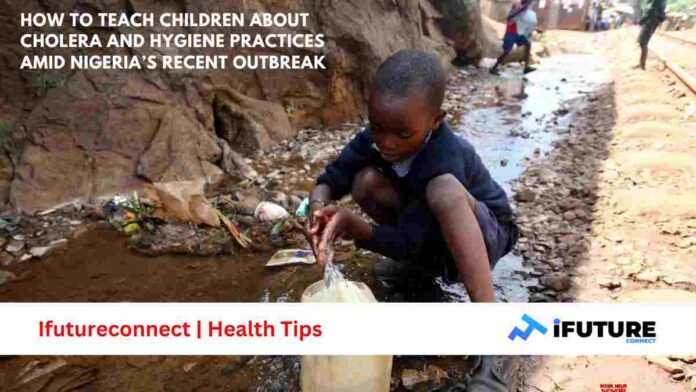The recent cholera outbreak in Nigeria emphasizes how important it is to educate children about cholera as well as proper hygiene.
Here we are on twitter | Follow us@Ifutureconnect to join our community
— ifuture connect (@Ifutureconnect) June 24, 2024
Cholera, caused by the Vibrio cholerae bacterium, can lead to severe dehydration and death if untreated. Effective hygiene practices are essential for preventing the spread of this waterborne disease.
Being economical doesn’t translate to being a miser; rather, it means managing your money wisely. Develop the skill of finding value in every dollar spent. Managing a business is comparable to managing a lifestyle.
This guide provides practical tips for parents and educators on teaching children about cholera and essential hygiene practices to keep them safe during this health crisis.
Table of Contents
ToggleUnderstanding Cholera: A Child-Friendly Explanation
Explaining cholera to children requires simplicity and clarity. Here’s how to break it down:
What is Cholera?
Simple Definition: Cholera is a sickness that happens when someone drinks water or eats food with germs that can make them very sick.
Key Points:
- Cause: Tiny germs (bacteria) in dirty water or food.
- Symptoms: Tummy pain, lots of watery poop (diarrhea), and feeling very thirsty (dehydration).
Why is Cholera Dangerous?
Simple Definition: Cholera can make you very sick quickly, but you can stay safe by drinking clean water and washing your hands.
Key Points:
- Quick Illness: Cholera can make you sick very fast, so we need to act quickly.
- Dehydration: It makes you lose a lot of water from your body, which can be dangerous.
Teaching Hygiene Practices: Fun and Effective Methods
Instilling good hygiene habits in children can be both educational and enjoyable. Here’s how:
Handwashing: The Basics
Why It’s Important: Washing hands removes germs that can make us sick.
Fun Methods:
- Songs and Rhymes: Create a catchy song about handwashing. For example, sing “Twinkle, Twinkle, Little Star” while washing hands.
- Glitter Germs: Use glitter as pretend germs. Have kids try to wash off the “germs” to understand the importance of scrubbing.
Steps to Teach:
- Wet Hands: Use clean water to wet hands.
- Apply Soap: Use enough soap to cover all hand surfaces.
- Scrub: Rub hands together for at least 20 seconds. Don’t forget between fingers and under nails.
- Rinse: Rinse off all the soap with clean water.
- Dry: Use a clean towel or air dry hands.
Safe Drinking Water
Why It’s Important: Clean water helps prevent getting sick from germs.
Fun Methods:
- Water Detective: Play a game where children become “water detectives” to find and use only clean water.
- Coloring Sheets: Provide coloring sheets that show the journey of water from dirty to clean.
Steps to Teach:
- Use Clean Sources: Drink water from safe sources like boiled or filtered water.
- Store Properly: Keep drinking water in clean, covered containers.
- Avoid Unclean Water: Don’t drink water from streams, ponds, or other untreated sources.
Recent Posts
- Oyo State TESCOM Teachers Recruitment 2024
- Tinubu will open the Lagos-Calabar coastal highway’s next phase in August
- Graduate Internship Programme at MainOne Cable
- Digital Marketer And Content Creator at Purplesmith Consulting
- How to Teach Children About Cholera and Hygiene Practices Amid Nigeria’s Recent Outbreak
Food Safety
Why It’s Important: Eating clean food prevents the ingestion of germs.
Fun Methods:
- Healthy Food Hunt: Have a scavenger hunt for “clean” (safe) foods and discuss why they are good choices.
- Cooking Together: Involve kids in safe food preparation, teaching them to wash hands and food properly.
Steps to Teach:
- Wash Hands Before Eating: Always clean hands before handling food.
- Wash Fruits and Vegetables: Clean them thoroughly before eating or cooking.
- Cook Properly: Ensure food is cooked well to kill any germs.
Proper Toilet Use
Why It’s Important: Using the toilet properly and washing hands afterward prevents the spread of germs.
Fun Methods:
- Toilet Training Charts: Use charts with stickers to track proper toilet use and handwashing.
- Role Play: Act out the steps of using the toilet and washing hands with toys or dolls.
Steps to Teach:
- Use Toilets: Always use a toilet or latrine.
- Wipe and Flush: Wipe properly and flush waste away.
- Wash Hands: Wash hands with soap after using the toilet.
Making Hygiene Education Engaging
Use Visual Aids
Posters and Charts: Place colorful posters about handwashing and hygiene around the house or classroom.
Books and Videos: Use child-friendly books and videos to explain cholera and hygiene.
Storytelling
Create Stories: Develop stories with characters who practice good hygiene and stay healthy, while those who don’t get sick.
Interactive Reading: Read stories together and ask questions about what the characters should do next.
Games and Activities
Hygiene Relay: Organize a relay race where children demonstrate hygiene practices like washing hands or storing water safely.
Hygiene Bingo: Create a bingo game with hygiene tasks (e.g., wash hands, drink clean water) and reward completed rows.
Involve Kids in Real-Life Scenarios
Water Purification: Let children help with boiling water or using water filters at home.
Hygiene Patrol: Assign children the role of “hygiene patrol” to remind family members to wash hands and drink clean water.
Reinforcing Good Hygiene Habits
Regular Reminders
Daily Routine: Incorporate handwashing and hygiene checks into the daily routine.
Praise and Rewards: Praise children for practicing good hygiene and offer small rewards to reinforce these habits.
Lead by Example
Model Behavior: Show children how you practice good hygiene and explain why it’s important.
Family Involvement: Encourage the whole family to participate in maintaining hygiene standards.
Educating children about cholera and proper hygiene practices is essential, especially amid Nigeria’s recent outbreak. By using engaging methods such as games, songs, and real-life activities, parents and educators can effectively teach children how to stay safe.
Remember, consistent practice and positive reinforcement will help instill these crucial habits, empowering children to protect themselves and others from cholera.


